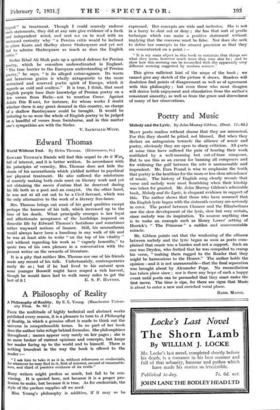Poetry and Music
Melody and the Lyric. By John Murray Gibbon. (Dent. l 2a. 6d.)
MANY poets confess without shame that they are unmusical. For this they should be pitied, not blamed. But when they declare an antagonism towards the alliance of music and poetry, obviously they are open to sharp criticism. All poets at some time have suffered the pain of hearing their work mutilated by a well-meaning but out-of-tune composer.. But to use this as an excuse for banning all composers and for widening the gulf between the arts is unreasonable and imprudent. Mr. Ezra Pound is wise to emphasize the truth that poetry is the healthier for the more or less close attendance' of music. The history of English song clearly reveals that verse and melody were most flourishing when their kinship was taken for granted. Mr. John Murray Gibbon's admirable book, Melody and the Lyric, is eloquent evidence in support of this. The author shows that those who have assumed that the English lyric began with the sixteenth century are seriously in error. The period between Chaucer and the Elizabethans saw the slow development of the lyric, slow but very certain, since melody was its inspiration. To assume anything else is to make an . example such as Henry Lawes' setting of Herrick's " The Primrose " a sudden and unaccountable miracle.
Mr. Gibbon points out that the weakening of the alliance between melody and the lyric began as soon as poets com- plained that music was a burden and not a support. Such an one was Dryden, who fretted that he was compelled to cramp his verse, " making them rugged to the Reader that they might be harmonious to the Hearer." The author holds the opinion—and it is not unreasonable—that the final separation was brought about by Alexander Pope. No reconciliation has taken place since ; nor is there any hope of such a happy event until poets can be persuaded that they must make the first move. The time is ripe, for there are signs that Musks is about to enter a new and enriched vocal phase.
Rem MAINE.










































 Previous page
Previous page